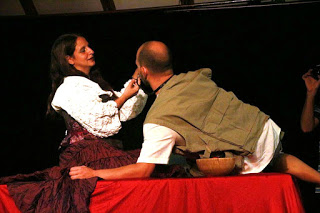pamela hickman’s concert critique blog
The Haifa Studio Theatre premieres Aviram Freiberg’s two chamber operas based on stories of S.Y Agnon
The Studio Theatre (Haifa) has just premiered two chamber operas based on short stories of S.Y.Agnon – “The Lady and the Peddler” and “Splendour”. Aviram Freiberg adapted the texts and wrote the music for both. Jonathan Szwarc was stage director, with Tavor Gochman serving as musical director and pianist. Singers taking part were soprano Ayelet Cohen, tenor Alexander Yagudin and alto Liat Rockberger. This writer attended the performance on July 18th 2017 at the Jerusalem Khan Theatre.

“The Lady and the Peddler” (1966) tells of a Christian woman (Helena) who lives in isolation in the woods. A Jewish peddler (Joseph) stumbles upon her house, is ensnared by her charms, moves in and has carnal relations with her, only to discover that she has devoured her previous mates. Gradually, Joseph realizes that Helena intends to kill him, eat his flesh and drink his blood, as she hints she has done to her previous “husbands”. She tries to kill him but fails, then killing herself. The story ends with Joseph leaving her house, with Helena’s frozen body left on the roof to be devoured by her own birds of prey. This horror story is laden with symbolism on all levels. In his interpretation, Freiberg focuses the relationship between the person dominating and the one who is dominated, attacker and attacked, the host and the parasite, the woman and the man. For the role of Joseph, he chooses to have him sung by a tenor singing in his low (and inconvenient) register to convey the uncomfortable (indeed threatening) situation in which Joseph finds himself. An interesting development is that Helena loses interest in killing and eating Joseph, while he is unaware of this change. In order to create integration of text and music, Freiberg chooses to use leitmotivs to suggest people, objects and ideas. The stage set consists of a table, serving as a house, a bed, roof etc., and a large length of red cloth whose final use is that of a shroud. Freiberg’s engaging but uncluttered musical score of clean, intelligible melodic lines invites the audience to follow the plot and its two characters with ease. Ayelet Cohen’s technical assurance, her creamy voice, easeful and richly colored in all registers, coupled well with her convincing enquiry into the role, her body- and facial language. Tenor Alexander (Sasha) Yagudin’s warm vocal timbre, musicality and comfortable stage presence gave credence to his portrayal of Joseph. Tavor Gochman’s musical direction and keyboard playing (in both operas) were vital, sensitive and strategic in timing.
Agnon wrote “Tehilla” in the 1950s. The story is centred on a righteous old woman whom the narrator meets in Jerusalem’s Old City in the 1920s during the British mandate period. Tehilla herself personifies kindness and good deeds but has suffered tragedy in her life, which becomes apparent as the story unfolds. The narrator who is also a writer becomes involved in her story about sin, suffering, repentance and forgiveness. In the program notes, both Aviram Freiberg and Jonathan Szwarc relate to the characters and how they wish to portray them, hence Freiberg’s choice of a soprano (Ayelet Cohen) for the role of Tehilla and a contralto (Liat Rockberger) for the rabbi’s wife. Alexander Yagudin was the narrator. With the story deeply entrenched in Jewish tradition and thought, Freiberg’s score, guided by Agnon’s musically oriented language, included many associations of Jewish music. He also chose to use speech in different forms as a means of highlighting meaningful moments of the story’s development. The bleak stage set gave spine-chilling focus to the three personalities and what qualities each represented as did moments when the music played on and the characters were silent. On this shadowy, eerie background, singers and pianist convincingly unearthed the story’s horrifying family secrets and their results, nevertheless bringing Agnon’s story to its more positive outcome of forgiveness.
Pamela Hickman, 21.7.17, http://